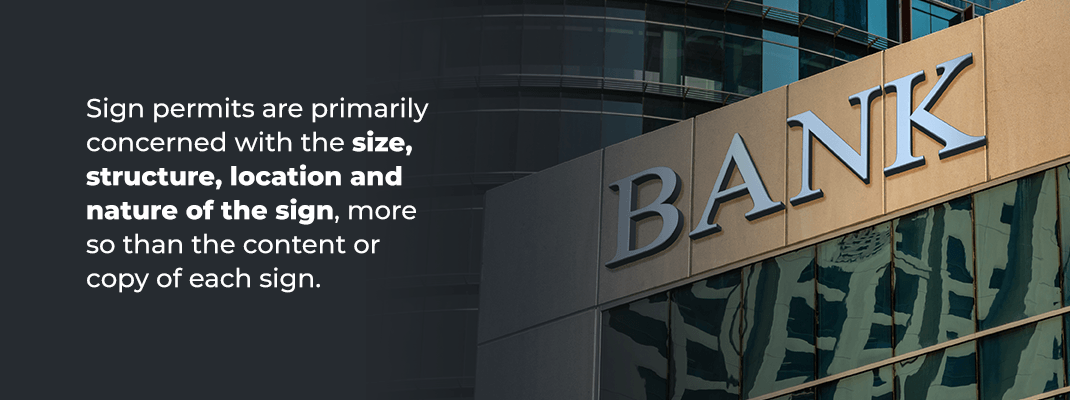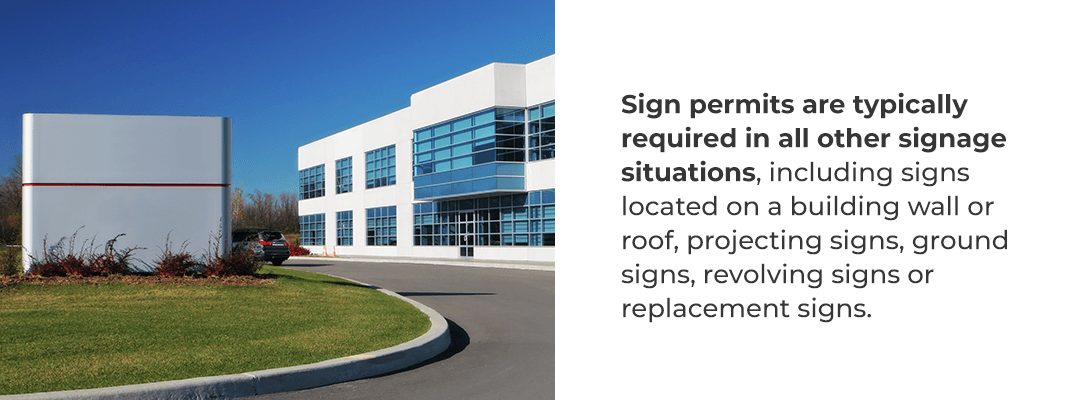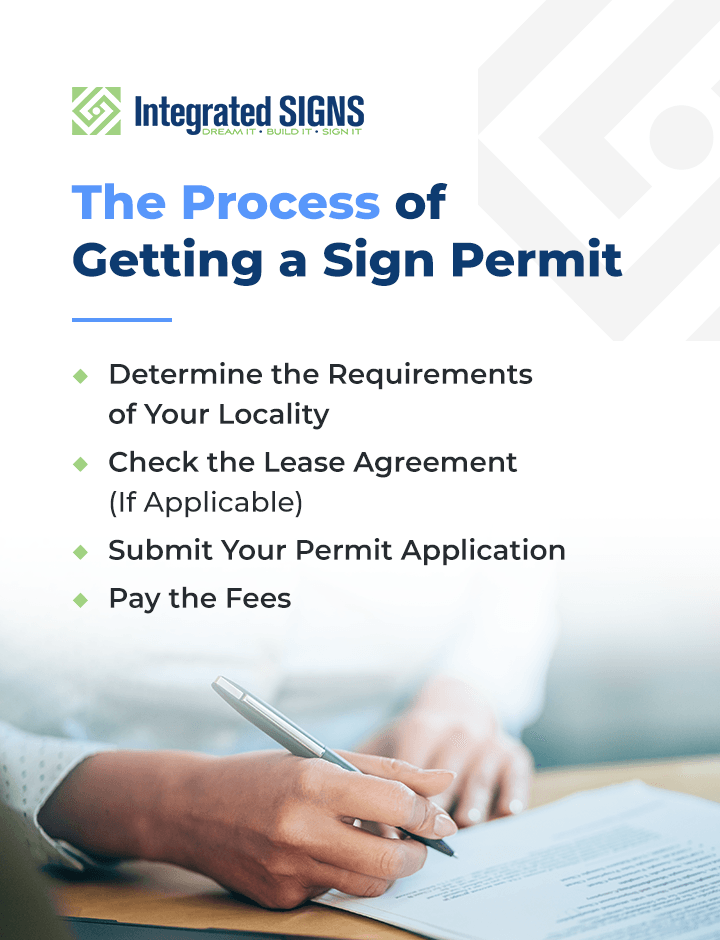Pulling a permit used to be a simple and over-the-counter process. As cities grow and evolve, so has the sign permitting process.
Pulling a permit is now an art form as much as it is a nuisance. The city wants to make sure any signs created and installed are the right size to the sign code, wired and installed correctly, and capable of safely weathering severe and inclement weather.
Each city has a specific way they need drawings produced and presented to them, so they can easily stamp out and approve.
Contact Integrated Signs To Ask About Our Permit Services
Working with Integrated Signs, navigating these specifications with the city are a thing of the past. With over 3 decades of experience, we are very familiar with all ordinances and the sign permit process from start to finish.
We incorporate your sign permit into your project, handling all aspects of city permits and being present for all review board meetings – so you don’t have to lift a finger. We have you and your sign covered.
Sign Permits 101
A city without signs is difficult to imagine, but if you came across one, it would likely feel disorienting, eerie and uninviting! While seasoned locals might know their way around in such situations, visitors or those new to the area would have little to no frame of reference for learning how to get anywhere or what types of services are available in the community.
At the same time, you musn’t scatter signs about haphazardly. Otherwise, they could be just as disorienting and even dangerous to pedestrians and drivers passing by, causing distractions or impeding the normal flow of traffic while creating a disorganized aesthetic within the overall community.
All that to say, signs are essential to the proper functioning of any community and jurisdiction, not only for the general public but also for businesses in the community. According to the Sign Research Foundation, 54 percent of American consumers could not find a particular business due to an unclear or complex to see the sign, while 60 percent of businesses report an average sales increase of at least 10 percent when updating or adding new signs.
However, equally as necessary is the optimal and proper placement of signs within the community for the presentation of the community and the safety of everyone. For this reason, Most cities, towns and villages across the country enforce sign permits to ensure that the signs contribute positively to the community’s goals and overall functioning.
Table of Contents
- What Is a Sign Permit?
- Why Are Sign Permits Important?
- When Do You Need a Sign Permit?
- Who Needs to Have a Sign Permit?
- How Early Should You Apply For a Sign Permit?
- The Process of Getting a Sign Permit
- What Happens if You Build Without a Sign Permit
- Integrated Signs Handles the Sign Permit Process with Your Sign Project
What Is a Sign Permit?
A sign permit refers to written legal permission from a local jurisdiction that allows a business to publicly display information in words, symbols or pictures intended to advertise their services.
In general, sign permits are primarily concerned with the size, structure, location and nature of the sign, more so than the content or copy of each sign. The regulations for on-premise messages (including advertising or identifying goods or services) and public interest messages (including political, religious, ideological, or governmental information) for signs are broad enough to encompass virtually any sign.
Sign ordinances do not infringe on free speech laws. The Reed v. Town of Gilbert case, which involved the Supreme Court, is a fascinating example of the potential for Free Speech infringements with sign permits.
Furthermore, each jurisdiction has different regulations concerning sign permits. In San Diego, there are various rules and regulations concerning the types of signs that require sign permits and those that do not and those that require other licenses, such as neighborhood use permits, public right-of-way permits or outdoor advertising display permits. Moreover, each city in San Diego county has sign ordinances that vary concerning the size, location and type of signs that you can install with or without a permit.
Why Are Sign Permits Important?
Sign permits are essential for numerous reasons! Some specific reasons that virtually every jurisdiction across the country requires sign permits include:
- They optimize communication.
- To ensure signs are aesthetically pleasing, of good quality and assembled correctly to withstand storms.
- To make sure the signs are not overly distracting to drivers or pedestrians or set up in a potentially hazardous way.
- To foster healthy competition amongst different businesses.
- To safeguard the public right-of-way, which includes public roads, streets, highways, sidewalks, alleys, waterways, boulevards, parks or any other area owned by the government for public use
- To uphold the aesthetic character of a particular city, town or village
While the freedom to put up a sign that advertises your business whenever and wherever you feel like it may seem appealing, the necessity of receiving permission before putting up a sign that promotes your business in a public space or on the exterior of your building is in the interest of every company and individual residing in a given city or town.
For businesses, whether they are locally-owned or part of a larger corporation, sign permits prevent larger businesses from taking advantage of smaller businesses by regulating where and how often any business can advertise its services, which levels the advertising playing field.
For the ordinary civilian, sign permits give the local city or town government the final say before a business can put up an advertising eyesore in the middle of a city park or other area dedicated to the enjoyment and leisure of the public. Sign permits also ensure roadside signs are not so bright, big or distracting that they could cause an accident. In this way, sign permits foster a strong business network and overall commitment to the safety and aesthetic integrity of your city.
Besides the benefits of sign permits to the general public, they are also essential to obtain so that you do not incur fines, penalties or other legal actions from the city government!
When Do You Need a Sign Permit?
Generally, a business will require a sign permit for any publicly visible sign it installs on its property or a public area. However, there are some exemptions where you are not required to have a sign permit. As such, it may be more helpful to detail the types of signs that you do not need a sign permit for, particularly in San Diego. With that in mind, the sign permit exemptions in San Diego include the following:
- Changing the content on a sign or any sign maintenance that does not involve structural or electrical changes
- Construction or real estate signs that are not illuminated
- Identification nameplates that do not exceed three inches tall or an area of four square feet, such as memorials built into the side of a building to pay tribute to an individual or organization
- Accessory signs that issue a warning or notice, such as “no parking,” “no smoking,” or “beware of dog,” signs that do not exceed an area of 12 square feet and are not illuminated
- Window signs, including both temporary and permanent signs
- Bulletin boards and supporting structures for charitable or religious organizations that are not illuminated and do not exceed an area of 16 square feet
- National flags
- Exterior signs that are neither illuminated nor visible to the public right-of-way
- Signs in the interior of the building, except signs in the lobby of a theater or shopping mall
- Fire lane signs required by the local fire department
- Temporary signs, such as banners, pennants or streamers on your property for an event that are installed no more than 30 days before an event and are removed within seven days of the event
Sign permits are typically required in all other signage situations, including signs located on a building wall or roof, projecting signs, ground signs, revolving signs or replacement signs. As such, if you are planning on putting up a sign for your business that does not meet any of the San Diego exemption criteria, make sure you get a permit before installing the sign.
Who Needs to Have a Sign Permit?
Any privately-owned business or corporation that wants to install a sign on public or private property that does not meet the San Diego exemption criteria will require a sign permit before the sign installation. While certain exemptions apply to charitable and religious organizations for some signs (i.e., bulletin boards that meet established specifications), it is important to read up on those exemptions and regulations for signage, as there are situations where such organizations will require a permit to install specific signs.
How Early Should You Apply For a Sign Permit?
Preparing to apply for a sign permit can be a drawn-out ordeal with several hoops and hurdles to get through. As such, it is in your best interest to start the process of applying for a sign permit as soon as you know the specifics for your sign(s), including their dimensions, content, location, and structure. You will also want to make sure you are clear on the sign permit requirements for your location. In total, preparation for sign permit applications can take anywhere from a week or two to several months.
Some factors that can affect the length of the sign permit process include the type of sign you want and whether or not your business operates in a historical building.
The Process of Getting a Sign Permit
While the process of getting a sign permit will ultimately vary depending on your specific location, here is what you can expect of that process if you are seeking a sign permit in San Diego County.
1. Determine the Requirements of Your Locality
As mentioned, each city and zoning area in San Diego county has particular regulations and requirements for installing or altering signs in their community. With that in mind, the first step in the process of getting a sign permit involves educating yourself on the particular sign ordinances within your community, the locale of your business operations or of those in the area where you are interested in installing a sign advertising your services.
In most communities, the business owner installing the sign will not sign the permit themselves but require a licensed sign permitting agency, such as Integrated Signs, to mark the license.
2. Check the Lease Agreement (If Applicable)
Suppose you are renting or leasing the building that you are operating your business out of. In that case, you will also want to review the lease agreement provided by the property landlord to make sure you follow any stipulations outlined in the contract about signage. Suppose the lease agreement details about signage are unclear or absent. In that case, it is still a good idea to get written approval from the property landlord to avoid any resistance or pushback to an already installed sign down the road.
3. Submit Your Permit Application
Submitting the sign permit application takes up the lion’s share of the time and effort into acquiring a sign permit, as there is a significant amount of information you will need to compile to satisfy the application requirements of the jurisdiction reviewing the application. Moreover, if you submit a permit application for multiple signs, some jurisdictions will require separate applications for different signs. So be prepared to go through the sign permit process numerous times if you have more than one sign you want to install.
In terms of the information that the jurisdiction reviewing your application will require from you, be prepared to provide the following:
- Business licenses and permits
- Building permits
- Site plan, which involves project information, illustrations and inventory of the signs you plan to install and any information regarding attachment methods
- Written consent or approval from the property landlord or owner (if applicable)
- Zoning compliance certifications, which outline the zoning, building and permit information of your property
4. Pay the Fees
Once you have appended all of the requisite information to your sign permit application, there will be a few fees to pay, including permit fees for the particular sign, general maintenance plan fees, mapping fees and records fees. General maintenance plan fees are for the city’s General Plan, which every California city must have and involves such things as blueprints for the future, policy goals and objectives for city development.
The mapping fee funds efforts for automation and geographical analysis from Developmental Services. All permits require record fees. While the price for each type of sign varies, the other standard fees are as follows:
- General Maintenance Plan Fees: $450.00
- Mapping Fee: $10.00
- Records Fee: $21.26
If one or more of your signs contain electrical components placed on a high-rise wall or beside a freeway, an inspection will also be required as part of the sign permit process. Moreover, the sign permit process may be subjected to two rounds of approval, including an administrative approval, which evaluates whether the sign is up to code, and design approval, which assesses how well the aesthetics of the sign blend with the surroundings.
What Happens if You Build Without a Sign Permit
Building without a sign permit is a significant risk to take, as doing so will make your business liable to up to $10,000 in fines, penalties or other legal actions on behalf of your city or local jurisdiction. While such measures are not always taken or enforced, they can cause significant inconveniences and costly problems if your city penalizes your business for installing a sign that does not meet the exemption criteria without a permit.
While complicated, sign permits are a necessary part of public advertising today. However, since the sign permit process can be rife with headaches, it pays to enlist a professional sign permitting agency intimately familiar with the ins and outs of the signs ordinances and regulations of your jurisdiction.
Integrated Signs Handles the Sign Permit Process with Your Sign Project
Suppose you want professional assistance in getting started with a sign permit application for your business in San Diego, CA. In that case, we welcome you to reach out to us at Integrated Signs! We will incorporate your sign permit application into our streamlined and seamless process from start to finish. Feel free to give us a call at 619-579-2229 or fill out our contact form here.





